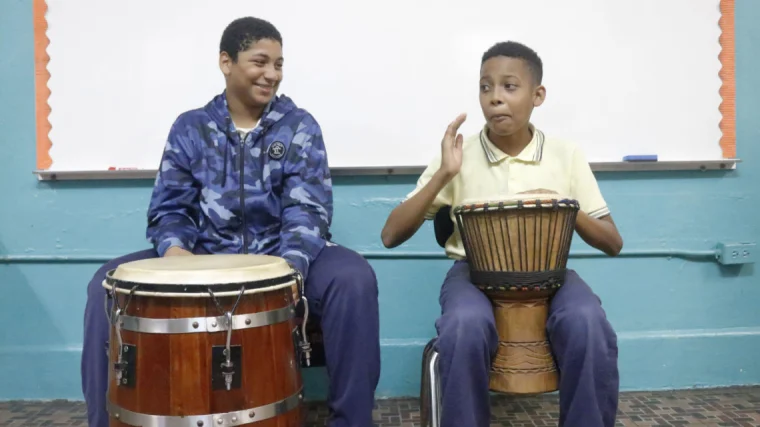Listening to music can trigger emotions and memories, while playing music uses the brain’s motor system, creativity centres and relies on long, medium and long-term memory. Musical ability has been associated with both genius and madness. With such a strong connection to what goes on in our heads, it is no wonder that music and mental health have a close association. But can music be used to help with mental health?
From Mozart to Cobain, there has long been an association between mental health and musical ability, with the concept of musicians struggling with depression and addiction becoming such a trope to be a cliche. But the flip side of this connection is that music, whether listening, composing or playing, can have tremendously positive effects on your mental health.
To begin with, active music listening can have a profound impact on your mood. We all have our go-to happy songs, and frission, that feeling of the chills we get from listening to uplifting music, is accompanied by a release of dopamine, “the happy hormone”. But also, studies have shown that listening to positive or upbeat music can have an overall positive effect on mood in just two weeks.
Sing the blues
Of course we don’t always feel like listening to “upbeat music”. For some, listening to bubble-gum pop or high-energy techno for two weeks might be an unpleasant experience, rather than improve mood. Many of us feel drawn to darker music, whether it be noise-rock, Beethoven, or mournful blues. Yet some psychologists believe that listening to sad music when we’re sad, paradoxically can help us regulate moods. “Sad” music, doesn’t have to be a sad experience. Having your feelings validated is a positive experience, creating a sense of empathy with music.
Having a way of articulating your feelings through periods of profound loss, can be comforting. Research suggests that the feeling of connection that one finds when listening to music that matches a feeling of sadness or loss, can help to regulate our mood, enabling emotional healing.
Both music and lyrics can help. Often emotions take time to come to the surface and can become buried. Relating to a sad story told by someone else can create vicarious emotions, helping us to unleash our own feelings. Lyrics analysis and musical storytelling are techniques now used in music therapy. Examining pieces of music we are close to can help us identify themes that match our own life experiences, helping us to navigate through difficult circumstances.
Likewise, playing music, especially in an improvisational group context, can also help to process emotions and bond over shared
experiences. one such example is the aftermath of the devastating hurricane that hit Puerto Rico in 2017. The hurricane killed some 3,000 people and displaced a further 200,000. Many young residents were left traumatised with around 7.2 percent reporting PTSD. Following this, the charity Puerto Rico Rise Up raised money to run a series of music therapy workshops for children on the island to help them express themselves in non-threatening ways.
Complicating matters
Addiction and substance abuse, which are mental health issues in themselves, can be complicated and exacerbated by other mental health issues. Dual-diagnosis occurs between 6-15% in addiction cases, according to a report by the UK National Institute for Health and Care Excellence (NICE).
But beyond official statistics, things are more complex. Addiction can be both caused by and trigger mental health issues. Alcohol is a depressant, and even slight overuse can result in short-term feelings of depression, inadequacy and self-loathing. On the flipside, many people turn to alcohol and substance abuse to help them deal with mental health issues, triggering a cycle of misuse that can turn to dependence. Dealing with addiction, ie stopping drug and alcohol use, while experiencing other mental health issues can be complicated, and creative art therapies, including music, can help individuals come to terms with the sudden influx of emotions that is consistent with ceasing and addictive behaviour.
Focus on the mind
May 9-15th was Mental Health Awareness Week in the UK, and this year’s focus was on loneliness. In an increasingly atomised society, loneliness is a serious issue that both arises from, and contributes to, other mental health issues. For many addicts loneliness and isolation were contributing factors to their addiction, and yet isolation can also arise from active using.
Isolation can be caused by many circumstances. Displacement caused by factors such as economic need, enforced migration or escaping from abusive relationships, often results in individuals finding themselves in unfamiliar places with no personal network. But even people who have not moved can experience degradation of community caused by economic and political factors. Some of the highest rates of addiction can be found in communities that have experienced massive rates of unemployment and capital flight.
Without people we can connect with on emotional and social levels, it’s easier to form habits to numb emotions that we can’t regulate through talking or alleviate loneliness and boredom. Negative feelings, such a shame, paranoia or resentment can then make it harder to go back into society. Music as a bonding force can help to alleviate feelings of isolation and loneliness. These days many people bond over internet-based music fandoms (along with other popular arts such as a film and television), creating long-lasting friendships. Local music groups can be cheap to set up and help to retain community spirits.
Come together
Many addicts find that an active support network is the bedrock of their recovery. There are many primary support groups ranging from those run by health-care providers to independent support groups. The New Notes Orchestra seeks to support recovery by building a mission-based community. There are many benefits to partaking in groups such as New Note, or its sister group The New Note Strummers, and one of them is being part of a supportive community. In a world increasingly atomised, having a close connection to support groups can go a long way to improving mental health both on the level of an individual and community.
There are many organisations out there that can help with mental health issues.
musicmindsmatter.org.uk is an organisation dedicated to helping musicians with mental health issues.
mentalhealth.org.uk has lots of advice on how to maintain good mental health practices
nhs.uk/mental-health/ can help with urgent care, diagnosis and access to therapy and other mental health services.




